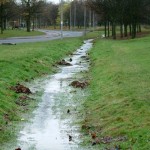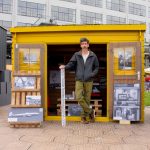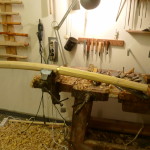- If you can read this, you are not a machine. [Gittit Szwarc]
- Clay PCB. [Patrícia J. Reis] “Our Clay PCB is not made of plastic but instead clay collected from the forest in Austria that was carefully prepared and modeled in a shape of a tile with an imprinted circuit, and later fired with wood in the nature. Our conductive tracks use urban-mined silver and all components are re-used from old electronic devices.” Via Roel Roscam Abbing.
- The revenge of the home page. [New Yorker] “As social networks become less reliable distributors of the news, consumers of digital journalism are seeking out an older form of online real estate.” Via Roel Roscam Abbing.
- The ‘boring phone’: stressed-out gen Z ditch smartphones for dumbphones. [The Guardian] “The problem with offlining is that the world is increasingly difficult for people without a smartphone.”
- This Irresistible Revolution. [The Point Magazine] “One of the ways that I “get offline” in the morning is by running—after which I upload my run to Strava.” Via Arts&Letters Daily.
- Ben Grosser, artist and creator of Minus, the opposite of Facebook. [Techtonic podcast]
- 2024 Small File Media Festival: Call for Work. Deadline: 15 June.
No Tech Reader #48: Digital Technology
No Tech Reader #47: Digital Technology
The “smartification of cycling”. [Journal of Urban Technology]. “In cities worldwide, cycling is increasingly upgraded with smart technology and is included in smart cities’ visions and projects. This process has not been problematized in public discourse, as smart innovation is seen as a potential booster of the known benefits of cycling. Drawing on critical literatures on smart cities, smart mobility, and degrowth and using the case studies of Copenhagen and Amsterdam, this article opens up a more critical conversation on the subject, discussing the role of “technosolutionism,” technology push, and pro-innovation bias in the process of “smartification” of cycling.”
Distinction and alternative tech: Exploring the technocritical disposition. [New Media & Society] “How should we understand alternative social media and open-source technologies that seek to challenge the dominance of Big Tech? Are these ethical substitutes for monopolistic platforms and technological infrastructures, or “alternative” in the sense we might talk of alternative forms of culture?”
Things Used to Work in This Country. [The New Atlantis] “Personal technology used to be a machine. Now it’s a bureaucracy.”
“Wherever you get your podcasts” is a radical statement. [Anil Dash] “Podcasting as a technology grew out of the early era of the social web, when the norms of technology creators were that they were expected to create open systems, which interoperated with tools by other creators and even other companies.”
The Loss of Things I Took for Granted. [Slate] “Ten years into my college teaching career, students stopped being able to read effectively.”
Center for Technological Pain. [website] “DIY solutions to health problems caused by digital technologies.”
B C, Before Computers. On Information Technology from Writing to the Age of Digital Data. [Open Book Publishers] “Computer developments rely on a long history of humans creating technologies for increasingly sophisticated methods of manipulating information.”
No Tech Reader #46: Transportation
- European car safety body is coming for touchscreens. [Politico] “The European New Car Assessment Programme mandates that key controls need physical buttons or switches.”
- A global survey of BikeBus initiatives. [ICTA-UAB] A Bike Bus is a group of children who ride their bike to school following a route with stops and timetables. Via Scope of Work.
- India’s electric rickshaws are leaving EVs in the dust. [Rest of World] “In the last decade, around 1.73 million three-wheeler EVs have been sold in India. Just last month, around 500 manufacturers — most of them homegrown — sold over 44,000 e-rickshaws, compared to less than 6,800 electric cars sold during the month.”
- Back on Track, an activist group for the return of night trains, is doing a crowdfunding to transform into a formal NGO.
No Tech Reader #45: Housing
Structural issues: the cost of material and the value of labour. [The Architectural Review] “In an alternative future, taxes would protect human labour and punish excessive material use to stop wasteful practices.” (Thanks to David Bourgignon.)
How to Build an Iron Age Village. [YouTube] “In Argüeso (Cantabria) a group of young researchers and artisans recreated in 1999 a Cantabrian town from the Iron Age.” (Thanks to Adriana Parra.)
The Masons of Djenne. [YouTube/National Museum of Natural History, Smithsonian Inst.] “The film captures a unique and very old building technique using handmade masonry, perfected through multiple generations in Djenne, a small town in the West African country of Mali.”
Rammed Earth Construction: A Circular Solution For Sustainable Building. [Latin American Structural Engineering and Construction Conference 2024] “The low level of skill required for rammed earth buildings paves the way for self-built activities.”
No Tech Reader #44: Tech & Politics
A Seamless Dystopia. [The Nation] “When I was younger, growing up in the rural but rapidly developing small town of my youth, I believed that cities were the place where one could find freedom. The greatest disappointment of my young adulthood has been the discovery that this is not true.” Via Arts&Letters Daily.
Surveilling Alone. [The New Atlantis] “Interpersonal surveillance technologies have rendered us far more visible to each other and given people a sense of security and safety when it comes to protecting their homes and loved ones. But they have not helped rebuild the one thing that human beings need to live together in peace: trust.”
After the Holocene. [Gene Ray] “Rightwing and leftwing “prepping” may share some practices and technics, but no equation between them is possible.”
Torching the Google car: Why the growing revolt against big tech just escalated. [Blood in the machine] “The original Luddites opposed “machinery hurtful to commonality,” not any and all new tech. Today’s self-driving car adversaries seem to be operating on a similar principle.”
The Goba of Ladakh: Current Relevance of a Traditional Governance System. [Vikalp sangam] Indigenous and other local traditional communities in India have had their own systems of local governance, which have informed people’s interaction with fellow community members as well as the rest of nature.
No Tech Reader #43
FARMING
- Comparing the carbon footprints of urban and conventional agriculture [nature cities]. “Results reveal that the carbon footprint of food from urban agriculture is six times greater than conventional agriculture. However, some crops (for example, tomatoes) and sites (for example, 25% of individually managed gardens) outperform conventional agriculture. These exceptions suggest that urban agriculture practitioners can reduce their climate impacts by cultivating crops that are typically greenhouse-grown or air-freighted.”
- Do you know how tomatoes taste? [Ambrook Research] “To get an ‘ideal tomato,’ many consumers may need to grow it themselves.”
- Have you heard of Wendell Berry? [Ambrook Research] “After years of written correspondence with the iconic rural writer, a “sixth-generation farm kid” reflects on getting to meet his hero.”
- George and the Food System Dragon. [Scan the Horizon] “In focusing his considerable powers of intellect and communication towards addressing problems of our food system George Monbiot appears to pick a fight not with agribusiness but with the food sovereignty movement.”
- In search of sustainable fragrance [Modern Farmer] “Many perfumes and fragrances are unsustainably extracted from plants and animals or made from synthetic chemicals. I wanted to find another way.”
- Moving into the Agrihood [Modern Farmer] “Planned, farm-centered neighborhoods are on the rise in the United States, offering farm-to-table food and a strong community for residents.”
- The farmers leaning on each other’s tools [Civil Eats] “The cost of specialized farm equipment is one of the biggest barriers for small-scale and beginning farmers. Cooperatives are springing up around the nation to help bridge the gap.”
- Podcast: “Perils of plastic packaging” [The Great Simplification].
- Podcast: “Chemicals in our clothes” [Craftsmanship Magazine]
- A Norwegian seaweed utopia? Governmental narratives of coastal communities, upscaling, and the industrial conquering of ocean spaces. [Maritime Studies] “The assumptive growth-centred policy narratives employed leave little room for small-scale, locally embedded alternatives called upon by many experts on sustainable and socially just blue resource governance.
DIGITAL TECHNOLOGY
- Where have all the websites gone? [from jason] “So when we wonder where all the websites have gone, know it’s the curators we’re nostalgic for because the curators showed us the best the web had to offer once upon a time. And the curators— the tenders, aggregators, collectors, and connectors— can bring us back to something better. Because it’s still out there, we just have to find it.”
- Songs made directly from sunlight [website]. Via Marie Verdeil.
- History and environmental impact of digital image formats [Unthinking Photography] “As the ecological footprint of photography shifted from film rolls and developing chemicals to digital storage, network transfer and processing power, I see only three ways to reduce our footprint: making fewer pictures, reducing their quality, or using better image formats. Which of these options do you prefer?” Via Marie Verdeil.
- In your face [The New Atlantis]. “Digital-device culture is an experiment on a colossal scale, the results of which we have tried to measure in IPOs, quarterly growth rates, engagement metrics, and daily active users, not in human flourishing. But that is where we are incurring the real costs.”
- The poster’s guide to the internet of the future. [The Verge] “The platform era is ending. Rather than build new Twitters and Facebooks, we can create a stuff-posting system that works better for everybody.”
- What are analog bulletin boards used for today? [Plos One] “The bulletin board still holds a firm place in a media ecology where local communication is in demand, and exists in parallel with electronic media.”
- The Anti-Ownership Ebook Economy [Engelberg Center] “Something happened when we shifted to digital formats that created a loss of rights for readers. Pulling back the curtain on the evolution of ebooks offers some clarity to how the shift to digital left ownership behind in the analog world.”
DEGROWTH
- Transforming work: A critical literature review on degrowth, post-growth, postcapitalism and craft labor [Journal of Cleaner Production] “Many scholars have called for a profound change in capitalist growth-oriented provisioning systems and business models to help address the unique socio-ecological challenges of the 21st century. Reenvisaging how work is organised, constructed, and valued is an essential part of this change.”
- The infrastructural conditions of (de-)growth: The case of the internet. [Ecological Economics] “Infrastructure studies represent a domain that remains significantly uncharted among degrowth scholars. This is paradoxical considering that infrastructures constitute a fundamental prerequisite for the equitable distribution of many aspects of human well-being that degrowth proponents emphasize.” Via Nate Hagens.
HIGH-TECH
- The new climate denial [Center for Countering Digital Hate]. Questioning high-tech “sustainable solutions” like electric cars and wind turbines is now considered “climate denial”.
- Dolly Parton: ‘I’m a low-tech girl in a high-tech world’ [Gossip Herald]
- The right to repairable energy: A political ecology of off-grid solar repair in Zambia. [Political Geography] “The sale of off-grid solar products in Zambia has grown rapidly over the past decade, with around 1 million small-scale solar products sold between 2018 and 2022. However, these products, which are promoted as a means for energy-poor populations to access basic energy services, tend to have short working lives.”
URBANISM
- A Fence and a Ladder: Subversive Acts of Everyday Urbanism at Home. [2021 AIA/ACSA Intersections Research Conference: COMMUNITIES] “This paper documents and examines the power of an informal, spontaneous, low-tech spatial gesture: a ladder built to straddle a fence between two properties. The ladder was built in order to give the children in the neighboring backyards a way to traverse the boundary easily, without the need for permission and without the risk of climbing and falling or cutting themselves.”
TRANSPORTATION
- Following a star: Study explores the remarkable ways traditional cultures use their environment to navigate. [University of York] Via Wrath of Gnon.
- New generation of Austrian Night Trains. [flickr]
- Road Hazard: Evidence Mounts on Toxic Pollution from Tires. [Yale360] “Researchers are only beginning to uncover the toxic cocktail of chemicals, microplastics, and heavy metals hidden in car and truck tires.”






